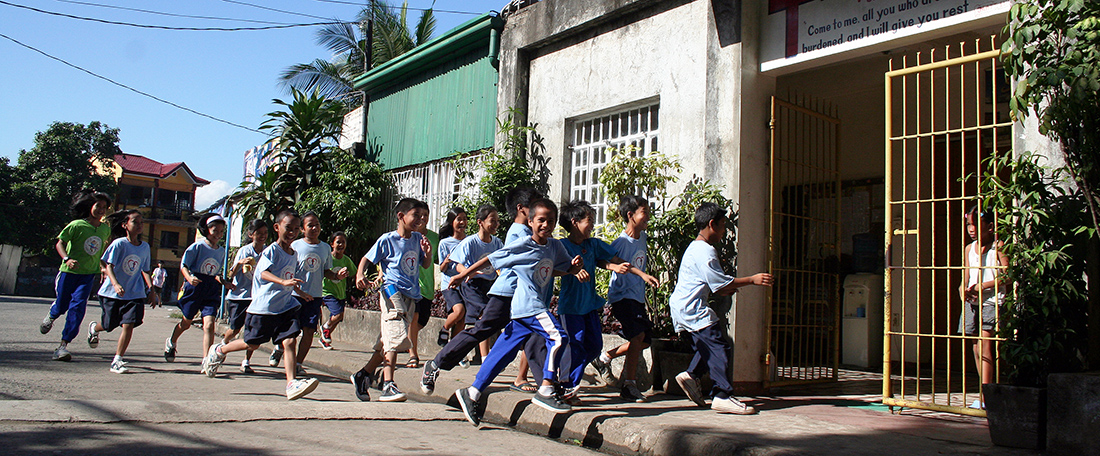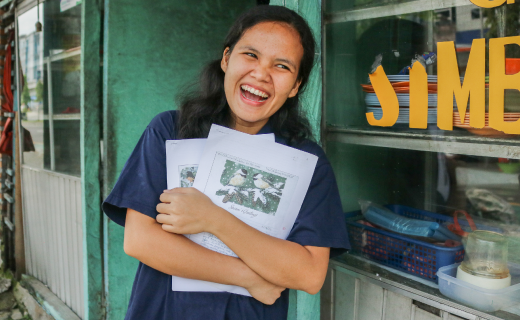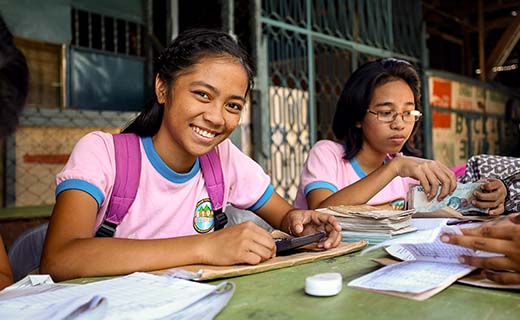Philippines
Capital City: Manila
Population: 100.99 million
Life expectancy: male 65.47 years, female 72.62 years
Population with improved drinking water: urban 93.7%, rural 90.3%
Population with improved sanitation: 74.3%
Infant mortality rate: 22.34/1,000
Under 5 mortality rate: 30/1,000
Adult literacy rate: male 95.8%, female 96.8%
Religion: Catholic 82.9% (Roman Catholic 80.9%, Aglipayan 2%), Muslim 5%, Evangelical 2.8%, Iglesia ni Kristo 2.3%, other Christian 4.5%, other 1.8%, unspecified 0.6%, none 0.1% (2000 census)
Percentage living on less than $1.90 a day: 13.11%
A little bit of history
Finding your way around the Philippines is no mean feat with more than 7,000 lush, tropical, mountainous islands. For centuries, the Philippines has been the meeting point of many cultures, including the Middle East, India and China. After being ruled by the Spanish and the Americans, the country became independent in 1946. In 1986, the 21-year rule of Ferdinand Marcos ended after widespread popular rebellion forced him into exile. Today, the country faces increased tension with China over disputed territorial and maritime claims in the South China Sea.
How the Philippines makes a living
The Philippines has weathered global economic and financial downturns better than its regional peers as it has fewer international exports and industries than its neighbours. Many within the country remain dependent on the estimated four to five million Filipinos who work overseas and send money home to support their families. Service industries and agriculture remain the other main income generating sectors but the country is looking to expand into business outsourcing in the future.
Challenges faced by children
With many on low and unpredictable incomes, children are often called on to help support families. It’s estimated that there are 5,000 child labourers in the Philippines who provide a vital income for their families and consequently miss out on gaining the education that could really improve their situation in life. Malnutrition is another major issue in the Philippines.
Compassion in the Philippines
Compassion's work in the Philippines began in 1972. Currently, more than 80,000 children participate in more than 345 child development centres.
What sponsored children learn in the philippines
Project days in The Philippines are generally held on Saturdays. During a typical project day, sponsored children will learn topics such as ...
- 8.00am Prayer and devotional time.
- 9.00am Spiritual lessons. Children sing songs and learn Bible stories.
- 10.30am Break time and snack. Children can play in a safe environment and develop friendships. Snacks could include bread, soup or another local delicacy.
- 11.00am Social lessons. From conflict resolution to developing healthy self-esteem and a Godly character, children who often come from challenging home environments are taught social and personal skills.
- 12.00pm Lunch and social time. A meal usually consists of fish or meat, vegetables and rice. A fair number of children skip meals at home due to food scarcity.
- 13.00pm Health lessons. Children are taught practical health and hygiene tips. Example topics include how to prevent malaria and the prevention, recognition and response to child abuse.
- 14.00pm Letter writing and career planning. Older children work with project staff to identify their strengths and interests, setting realistic goals for their future.
Additional activities offered by projects in The Philippines:
- Typical extracurricular activities include camps, sporting events, field trips and talent shows.
- There are general assemblies and orientation for parents, and there are some churches that have initiated activities such as Bible studies and care groups. The mothers are also involved in letter writing.





